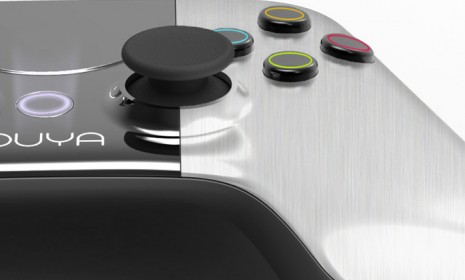Ouya: Can a $99 Android-powered gaming console topple Xbox?
Fans are fawning over an independent, open-source game system that's already attracted over $4 million in funding on Kickstarter

A free daily email with the biggest news stories of the day – and the best features from TheWeek.com
You are now subscribed
Your newsletter sign-up was successful
An ambitious little Kickstarter project has ballooned into a multi-million dollar video game venture. Meet the Ouya, a $99 Android-powered gaming console that could well turn the gaming industry on its head. Here's what you should know about the system, which has already raised more than a record $4 million for backers:
What does it do?
Traditional consoles like the Nintendo Wii, Xbox 360, and PlayStation 3 all cost between $200 and $300 and are all so-called "closed platforms," meaning you have to buy a $60 game that's system-specific from a retailer. But the small, industrial-looking Ouya is open-source, meaning any independent developer can build games for it using Google's Android platform. Gamers simply hook the Ouya up to their TV, download games online, and start playing with a real controller. "When I pitch people, the most common response is 'Huh. Yeah, that makes a lot of sense, I can't believe no one's done that,'" says Ouya founder Julie Uhrman. The goal is to have the Ouya in consumers' hands by March 2013.
The Week
Escape your echo chamber. Get the facts behind the news, plus analysis from multiple perspectives.

Sign up for The Week's Free Newsletters
From our morning news briefing to a weekly Good News Newsletter, get the best of The Week delivered directly to your inbox.
From our morning news briefing to a weekly Good News Newsletter, get the best of The Week delivered directly to your inbox.
Who's it for?
The Ouya is especially appealing to people raised on the original Nintendo who don't have a spare 10 hours of leisure a week to justify the cost of a $300 console, says Jared Newman at TIME, and so have taken to playing cheap games on their phones. Part of the Ouya's appeal is that all its games will have a free-to-play sampling element, "whether it's a brief demo or a full game replete with microtransactions." Not to mention it's "fully hackable," says Stephen Totillo at Kotaku, so enthusiasts can fool around with its innards to their heart's content. "This kind of openness is anathema to an outfit like Nintendo, that frowns on people even tinkering with their Wii to play play a game not coded to run on [it]." We think the Ouya system will "disrupt the console market," Uhrman tells The Guardian. "It's inexpensive, all the games will be free to play, and it's open to any developer that wants to make a game for the TV."
How much money has it raised so far?
As of Thursday morning, the project has attracted more than 31,100 backers and has raised $4,008,329, far exceeding its modest $950,000 goal. It's evident that gamers "are craving something different," says Tim Stevens at Engadget, "and if the Ouya is a success, it could usher us into a new golden age of gaming."
A free daily email with the biggest news stories of the day – and the best features from TheWeek.com
What kind of hurdles will it face?
Many gamers have "affectionate and well-established ties" to their existing consoles, says Nick Summers at The Next Web. But merely offering them a Call of Duty clone is "unlikely to budge them from the comforts of a familiar system." The other major problem is that many of the Ouya's games will already be playable on a phone or tablet. Consumers may be "unlikely to fork out on another console just to play the same game." Perhaps Ouya's biggest worry is waking slumbering giants like Google and Apple, says TIME's Newman. If the system's even a "modest hit," that might give the heavyweights the incentive to build their own comparable consoles.
Could it topple the Xbox?
"I don't think the Ouya signals the death of the established video game industry," says TIME's Newman. "I like big-budget games, and I hope the best ones find a way to survive even as the industry as a whole tumbles." But the timing could be right for Ouya to disrupt the market. "I think it will start as an indie/casual platform," analyst Michael Pachter tells Kotaku, but it'll need a solid user base in place before it can attract the creative talents of developers. "It's chicken and egg."
Sources: Engadget, Guardian, Kickstarter, Kotaku, The Next Web, TIME
-
 Film reviews: ‘Send Help’ and ‘Private Life’
Film reviews: ‘Send Help’ and ‘Private Life’Feature An office doormat is stranded alone with her awful boss and a frazzled therapist turns amateur murder investigator
-
 Movies to watch in February
Movies to watch in Februarythe week recommends Time travelers, multiverse hoppers and an Iraqi parable highlight this month’s offerings during the depths of winter
-
 ICE’s facial scanning is the tip of the surveillance iceberg
ICE’s facial scanning is the tip of the surveillance icebergIN THE SPOTLIGHT Federal troops are increasingly turning to high-tech tracking tools that push the boundaries of personal privacy